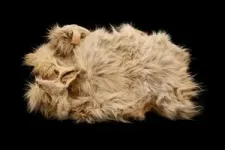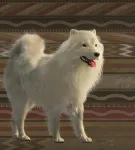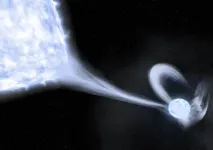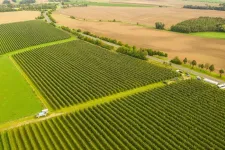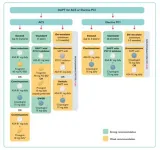(Press-News.org) Catarina Frazão Santos, researcher at the Faculty of Sciences of the University of Lisbon (Portugal) (Ciências ULisboa), has been awarded by the European Research Council (ERC) with a Starting Grant of approximately 1.5 million euros to study the benefits and challenges of developing sustainable, equitable and climate-smart marine spatial planning processes in Antarctica and beyond.
“We need to raise awareness and foster a ‘paradigm shift’ on how to plan for sustainability and equity in a changing ocean,” says Catarina Frazão Santos, researcher at the Marine and Environmental Sciences Centre – MARE at Ciências ULisboa, and leader of the PLAnT project (Planning the Sustainable Use of the Ocean in Antarctica in a context of Global Environmental Change), now awarded with an ERC Starting Grant.
https://youtu.be/3gWJdCiPwjc
“The main objective of the PLAnT project is to support the development and implementation of sustainable, equitable marine spatial planning initiatives that contribute to climate change adaptation and mitigation in Antarctica and across the planet”, explains the marine biologist, also Honorary Research Associate at the University of Oxford (UK) and NOVA School of Business and Economics (Portugal).
Over the past seven years, Catarina Frazão Santos has focused on an innovative and interdisciplinary research line on the interlinks among marine spatial planning, climate change, and ocean sustainability. With the PLAnT project, she and her team aim to advance the topic further, focusing on the unique case study of the Antarctic and Southern Ocean.
The PLAnT project is expected to start in February 2024 and will last 60 months. According to Catarina Frazão Santos, within the scope of PLAnT, it will be possible to develop an integrated vision and explore multiple futures and challenges to the use, conservation, and governance of Antarctic marine social-ecological systems. The project will also analyze the social, economic, and political factors that limit the implementation of marine spatial planning initiatives in Antarctica. Finally, PLAnT will focus on the transferability of identified solutions and lessons learned to other contexts, raising awareness of the benefits and fundamental importance of having sustainable climate-smart ocean plans.
“We will explore solutions for ocean-based climate adaptation and mitigation, as well as mechanisms to promote dynamic and adaptive planning in the region,” adds Catarina Frazão Santos.
Brief Biography of Catarina Frazão Santos
Catarina Frazão Santos has published her research in top scientific journals, such as Nature Sustainability and Nature Geoscience; she has supported the European Commission, the United Nations, and the World Bank as an expert in marine spatial planning and climate change; and she is the founding Editor-in-Chief of the new Nature group journal dedicated to ocean sustainability — npj Ocean Sustainability. Catarina Frazão Santos is also an invited researcher at the University of Oxford (UK) and at the NOVA School of Business and Economics (Portugal). Catarina Frazão Santos completed her PhD in Marine Sciences in 2016 at Ciências ULisboa. Her education in Marine Biology (Bachelor’s Degree) and Ecology and Environmental Management (Master’s Degree) was also obtained at Ciências ULisboa.
END
Climate-smart ocean planning in Antarctica awarded with 1.5M€ ERC starting grant
2023-12-14
ELSE PRESS RELEASES FROM THIS DATE:
Researchers, Coast Salish people analyze 160-year-old indigenous dog pelt in the Smithsonian’s collection
2023-12-14
Researchers from the Smithsonian’s National Museum of Natural History led a new analysis that sheds light on the ancestry and genetics of woolly dogs, a now extinct breed of dog that was a fixture of Indigenous Coast Salish communities in the Pacific Northwest for millennia. Anthropologist Logan Kistler and evolutionary molecular biologist Audrey Lin analyzed genetic clues preserved in the pelt of “Mutton,” the only known woolly dog fleece in the world, to pinpoint the genes responsible for their ...
Diverse gut bacteria communities protect against harmful pathogens by nutrient blocking
2023-12-14
UNDER EMBARGO UNTIL 19:00 GMT / 14:00 ET THURSDAY 14 DECEMBER 2023
Diverse gut bacteria communities protect against harmful pathogens by nutrient blocking
New study demonstrates that diverse communities of resident bacteria can protect the human gut from disease-causing microorganisms.
However, this protective effect is lost when only single species of gut bacteria are present.
The researchers found that protective communities block the growth of harmful pathogens by consuming nutrients that the pathogen needs.
The findings, published today in the journal Science, could help to develop new strategies to optimise gut health.
The ...
Astronomers discover first population of binary stripped stars
2023-12-14
Astronomers at the University of Toronto have discovered a population of massive stars that have been stripped of their hydrogen envelopes by their companions in binary systems. The findings, published today in Science, shed light on the hot helium stars that are believed to be the origins of hydrogen-poor core-collapse supernovae and neutron star mergers.
For over a decade, scientists have theorized that approximately one in three massive stars are stripped of their hydrogen envelope in binary systems. Yet, until now, only one possible candidate had been identified.
“This was such a big, glaring hole,” says co-lead author ...
Ancient genomics and Indigenous Knowledge reveal history of Coast Salish “woolly dogs”
2023-12-14
DNA analysis of a 19th-century dog, paired with traditional knowledge acquired through interviews, have together provided new insights into the decline of Coast Salish “woolly dogs” – an extinct Indigenous dog once bred for its unique woolly coat. Dogs were introduced to the Americas at least 15,000 years ago and have been ubiquitous in Indigenous societies across the continents for thousands of years. Coast Salish peoples – a group of Indigenous societies that lived in the Salish Sea region of the Pacific Northwest (PNW) – kept several different types of dogs, including a special lineage of “woolly ...
Science’s 2023 Breakthrough of the Year: GLP-1 agonists show promise for obesity-associated health problems
2023-12-14
Science has named the development of glucagon like peptide-1 (GLP-1) agonists and this year’s discovery that these drugs can blunt obesity-associated health problems as its 2023 Breakthrough of The Year. Although obesity’s causes span genetic, physiological, environmental, and social factors, as a medical problem, obesity’s risks can be life-threatening – including heart disease, diabetes, arthritis, liver disease, and certain cancers. Drug treatments for obesity have had “a sorry past, one often intertwined with social pressure to lose weight and the widespread belief that excess weight reflects weak willpower,” writes ...
Using genomics to map illegal pangolin poaching from Africa to Asia
2023-12-14
Genomic analyses reveal illegal pangolin trafficking routes from origins in Africa to markets in Asia, researchers report. The approach offers new opportunities to monitor pangolin poaching in near real-time, allowing for targeted and more effective anti-trafficking measures. The illegal wildlife trade is a significant driver of global biodiversity loss. Of all the species poached and traded, the white-bellied pangolin (Phataginus tricuspis) is the world’s most trafficked mammal and is at risk of extinction. Pangolins are in high demand in Asia because their scales are believed, without scientific support, ...
Solar-powered clothes provide personal heating and cooling
2023-12-14
Combining a flexible solar cell with an electrocaloric device, researchers have created solar-powered clothing that allows the body to adapt dynamically to changes in ambient temperature, according to a new study. The new device could help guarantee the safety and comfort of the human body amid fluctuating environmental temperatures and even extend survivability in extreme environments, like those in outer space or other planets. Clothing is the most common way humans regulate their body temperature relative to the environment. However, it is normally focused on keeping an individual either warm or cool. The ability of clothing to ...
Reaching for the (invisible) stars
2023-12-14
Supernovae–stellar explosions as bright as an entire galaxy–have fascinated us since time immemorial. Yet, there are more hydrogen-poor supernovae than astrophysicists can explain. Now, a new Assistant Professor at the Institute of Science and Technology Austria (ISTA) has played a pivotal role in identifying the missing precursor star population. The results, now published in Science, go back to a conversation the involved professors had many years ago as junior scientists.
Some stars do not simply die down, but explode in a stellar blast that could outshine ...
How can Europe restore its nature?
2023-12-14
The ‘Nature Restoration Law’ (NRL) requires member states of the EU to implement restoration measures on at least 20 per cent of land and marine areas by 2030, and in all ecosystems in need of restoration by 2050. This includes specific targets to rewet peatlands and to increase pollinator populations. The NRL has already overcome various hurdles: most recently, it was approved by the EU Parliament’s Environment Committee, after delegations of the Parliament and the Council negotiated the final text.
But will the regulation really achieve its aims? The authors, including scientists leading large European projects on ...
Updated Canadian Cardiovascular Society Guidelines advise against routinely taking aspirin daily for primary prevention of heart attack or death but acknowledge there may be a role for some people
2023-12-14
Philadelphia, December 14, 2023 – The updated Canadian Cardiovascular Society (CCS)/Canadian Association of Interventional Cardiology (CAIC) antiplatelet therapy guidelines for primary and secondary prevention of atherosclerotic cardiovascular disease (ASCVD) provide recommendations based on the latest randomized evidence available in the literature. Updated by a panel of national experts, these new evidence-based guidelines appear in the Canadian Journal of Cardiology, published by Elsevier.
ASCVD, also known as ischemic heart disease (coronary artery ...

